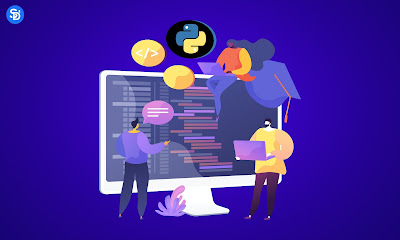Python for Web Development: Frameworks and Best Practices
Python has emerged as a go-to choice for web development, offering a wide range of frameworks and best practices to streamline the development process. With our expert Python development services, we help businesses harness the power of Python and its robust web frameworks. In this article, we will explore the top Python web frameworks, such as Django, Flask, and Pyramid, and delve into the best practices that ensure scalability, security, and efficiency in web application development. By partnering with us and leveraging our Python development services, you can unlock the true potential of Python and create exceptional web experiences for your users. Let's dive into the world of Python web development frameworks and discover the best practices that will elevate your web applications to new heights.
Python Web Frameworks:
Django:
Django is a powerful and popular Python web framework that simplifies the process of web development. With Django, developers can quickly build feature-rich web applications by leveraging its built-in functionalities and conventions. The framework follows the Model-View-Controller (MVC) architectural pattern, promoting clean code organization and separation of concerns. Django provides an easy-to-use admin interface for managing content, user authentication, and an ORM for database interactions, making it ideal for creating dynamic and interactive websites. Its extensive ecosystem of reusable components, known as "apps," allows developers to leverage existing functionality and focus on specific project requirements. With Django's emphasis on security, scalability, and efficiency, it has gained popularity among developers worldwide. Whether it's building a simple blog or a complex enterprise application, Django empowers developers to create robust and scalable web solutions with ease.
Flask:
Flask is a lightweight and versatile Python web framework that prioritizes simplicity and flexibility. With Flask, developers have the freedom to design and build web applications according to their specific needs. The framework provides essential features for web development, such as URL routing, request handling, and template rendering. Its modular design allows developers to choose from a wide range of extensions to add additional functionalities. Flask's simplicity makes it an excellent choice for small to medium-sized projects, RESTful APIs, and prototyping. Despite its lightweight nature, Flask remains powerful and adaptable, enabling developers to create efficient and scalable web applications. With its minimalist approach and extensive documentation, Flask empowers developers to quickly bring their ideas to life while maintaining a high level of control and customization.
Pyramid:
Pyramid is a versatile Python web framework that offers a balance between simplicity and scalability. It follows the "pay only for what you need" principle, allowing developers to start with a minimalistic structure and add components as required. Pyramid supports a variety of data storage options and offers flexible URL routing, making it suitable for both small-scale projects and large, enterprise-grade applications. Pyramid's emphasis on extensibility and scalability makes it a preferred choice for complex web development scenarios.
Python Web Development Best Practices:
Code Organization:
Organizing your codebase is crucial for maintainability and scalability. Follow a modular approach, dividing your code into reusable modules or packages. Use the MVC architectural pattern to separate concerns and keep your codebase organized. Django, Flask, and Pyramid all support this pattern, making it easier to structure your codebase effectively.
Use of ORM:
Leverage the power of Object-Relational Mapping (ORM) to interact with databases. ORMs, such as Django's built-in ORM or SQLAlchemy, provide an abstraction layer that simplifies database operations and reduces the risk of SQL injection attacks. ORM usage promotes code reusability, improves maintainability, and facilitates database migrations.
Templating:
Separate the presentation logic from the application logic using templating engines. Templating engines like Jinja2, which is integrated with Flask and supported by other frameworks, help in generating dynamic HTML pages by combining data with templates. Templating ensures a clean separation of concerns and promotes code readability.
Security Measures:
Web application security should be a top priority. Implement measures to prevent common security vulnerabilities, such as cross-site scripting (XSS) and cross-site request forgery (CSRF). Sanitize user inputs, validate form data, and apply proper authentication and authorization mechanisms to protect sensitive data and user sessions.
Testing and Debugging:
Adopt a robust testing and debugging strategy. Write unit tests to validate the functionality of individual components and integration tests to ensure the proper interaction between different parts of your application. Leverage tools like PyTest and Django's testing framework to automate testing. Use logging and debugging tools to identify and fix issues during development.
Performance Optimization:
Optimize your web application's performance by employing caching mechanisms, minimizing database queries, and reducing unnecessary network requests. Use tools like Redis or Memcached for caching, optimize database queries, and employ techniques like lazy loading to improve overall application performance.
Documentation:
Document your code and provide clear and concise documentation for your web application. Well-documented code enables better collaboration among team members and eases future maintenance and updates. Use tools like Sphinx to generate comprehensive documentation from your codebase.
Conclusion:
Python's versatility and the availability of robust web frameworks make it an excellent choice for web development. With our Python software development services, we harness the power of Python and its top web frameworks, including Django, Flask, and Pyramid. Our expert developers follow best practices such as code organization, leveraging ORM, ensuring security, testing rigorously, optimizing performance, and documenting your codebase. By partnering with us, you can build scalable, secure, and exceptional web applications using Python. Embrace the power of Python and leverage our Python software development services to create remarkable web experiences for your users. Trust us to deliver high-quality solutions that align with your unique business requirements.



Comments
Post a Comment